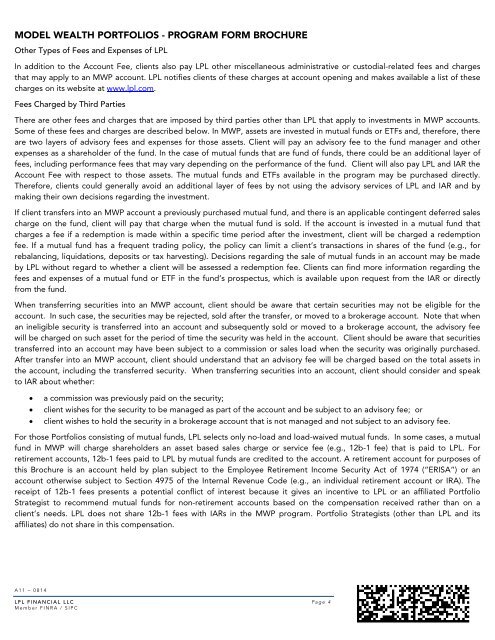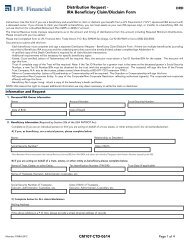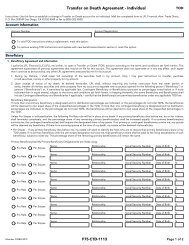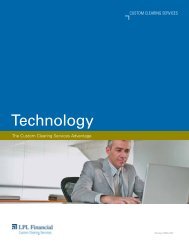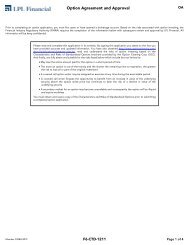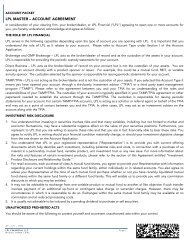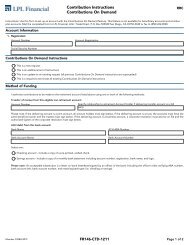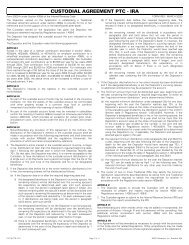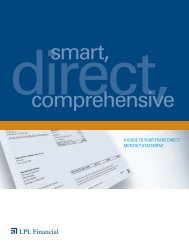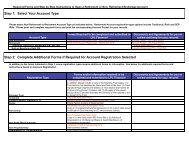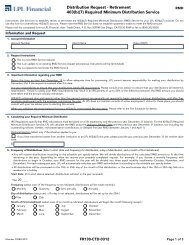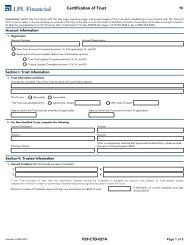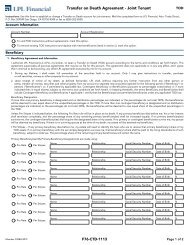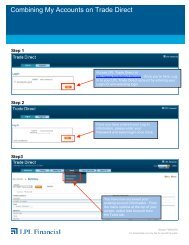Model Wealth Portfolios (MWP) - LPL Financial
Model Wealth Portfolios (MWP) - LPL Financial
Model Wealth Portfolios (MWP) - LPL Financial
You also want an ePaper? Increase the reach of your titles
YUMPU automatically turns print PDFs into web optimized ePapers that Google loves.
MODEL WEALTH PORTFOLIOS - PROGRAM FORM BROCHURE<br />
Other Types of Fees and Expenses of <strong>LPL</strong><br />
In addition to the Account Fee, clients also pay <strong>LPL</strong> other miscellaneous administrative or custodial-related fees and charges<br />
that may apply to an <strong>MWP</strong> account. <strong>LPL</strong> notifies clients of these charges at account opening and makes available a list of these<br />
charges on its website at www.lpl.com.<br />
Fees Charged by Third Parties<br />
There are other fees and charges that are imposed by third parties other than <strong>LPL</strong> that apply to investments in <strong>MWP</strong> accounts.<br />
Some of these fees and charges are described below. In <strong>MWP</strong>, assets are invested in mutual funds or ETFs and, therefore, there<br />
are two layers of advisory fees and expenses for those assets. Client will pay an advisory fee to the fund manager and other<br />
expenses as a shareholder of the fund. In the case of mutual funds that are fund of funds, there could be an additional layer of<br />
fees, including performance fees that may vary depending on the performance of the fund. Client will also pay <strong>LPL</strong> and IAR the<br />
Account Fee with respect to those assets. The mutual funds and ETFs available in the program may be purchased directly.<br />
Therefore, clients could generally avoid an additional layer of fees by not using the advisory services of <strong>LPL</strong> and IAR and by<br />
making their own decisions regarding the investment.<br />
If client transfers into an <strong>MWP</strong> account a previously purchased mutual fund, and there is an applicable contingent deferred sales<br />
charge on the fund, client will pay that charge when the mutual fund is sold. If the account is invested in a mutual fund that<br />
charges a fee if a redemption is made within a specific time period after the investment, client will be charged a redemption<br />
fee. If a mutual fund has a frequent trading policy, the policy can limit a client’s transactions in shares of the fund (e.g., for<br />
rebalancing, liquidations, deposits or tax harvesting). Decisions regarding the sale of mutual funds in an account may be made<br />
by <strong>LPL</strong> without regard to whether a client will be assessed a redemption fee. Clients can find more information regarding the<br />
fees and expenses of a mutual fund or ETF in the fund’s prospectus, which is available upon request from the IAR or directly<br />
from the fund.<br />
When transferring securities into an <strong>MWP</strong> account, client should be aware that certain securities may not be eligible for the<br />
account. In such case, the securities may be rejected, sold after the transfer, or moved to a brokerage account. Note that when<br />
an ineligible security is transferred into an account and subsequently sold or moved to a brokerage account, the advisory fee<br />
will be charged on such asset for the period of time the security was held in the account. Client should be aware that securities<br />
transferred into an account may have been subject to a commission or sales load when the security was originally purchased.<br />
After transfer into an <strong>MWP</strong> account, client should understand that an advisory fee will be charged based on the total assets in<br />
the account, including the transferred security. When transferring securities into an account, client should consider and speak<br />
to IAR about whether:<br />
• a commission was previously paid on the security;<br />
• client wishes for the security to be managed as part of the account and be subject to an advisory fee; or<br />
• client wishes to hold the security in a brokerage account that is not managed and not subject to an advisory fee.<br />
For those <strong>Portfolios</strong> consisting of mutual funds, <strong>LPL</strong> selects only no-load and load-waived mutual funds. In some cases, a mutual<br />
fund in <strong>MWP</strong> will charge shareholders an asset based sales charge or service fee (e.g., 12b-1 fee) that is paid to <strong>LPL</strong>. For<br />
retirement accounts, 12b-1 fees paid to <strong>LPL</strong> by mutual funds are credited to the account. A retirement account for purposes of<br />
this Brochure is an account held by plan subject to the Employee Retirement Income Security Act of 1974 (“ERISA”) or an<br />
account otherwise subject to Section 4975 of the Internal Revenue Code (e.g., an individual retirement account or IRA). The<br />
receipt of 12b-1 fees presents a potential conflict of interest because it gives an incentive to <strong>LPL</strong> or an affiliated Portfolio<br />
Strategist to recommend mutual funds for non-retirement accounts based on the compensation received rather than on a<br />
client’s needs. <strong>LPL</strong> does not share 12b-1 fees with IARs in the <strong>MWP</strong> program. Portfolio Strategists (other than <strong>LPL</strong> and its<br />
affiliates) do not share in this compensation.<br />
A11 – 0814<br />
<strong>LPL</strong> FINANCIAL LLC Page 4<br />
Member FINRA / SIPC


